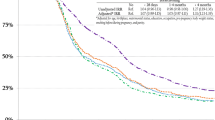Objectives: As both employed and breastfeeding mothers increase, more women are facing the decision of whether and how to combine the behaviors. This paper examines three hypotheses for a sample of low-income women: 1) Mothers who expect to return to work after the birth of their baby will be less likely to initiate breastfeeding; 2) The timing of the return to work and quitting breastfeeding will coincide; 3) Mothers in professional jobs and Stay-at-Home (SAH) Moms will breastfeed for longer durations than mothers with other types of jobs. Methods: The Fragile Families and Child Wellbeing Study, a sample of mostly low-income, unmarried U.S. mothers, offers a unique opportunity to study this issue, as there is reason to believe that employment may impact breastfeeding differently for low-income women. Logistic regression determines the relationship between the expectation of work and breastfeeding initiation, and discrete-time logit models examine breastfeeding duration, the timing of the return to work, and occupation type. Results: Expecting to work in the year after the baby's birth does not impact breastfeeding initiation. The timing of quitting breastfeeding and the return to work are closely and powerfully linked, and mothers in administrative and manual positions quit earlier than other women. Interestingly, women in service occupations do not differ in breastfeeding duration from SAH mothers or professionals. Conclusions: This research demonstrates that low-income women are having difficulty combining work and breastfeeding, which has important health implications for their infants, and that women working in administrative and manual occupations may face special constraints.

Similar content being viewed by others
Explore related subjects
Discover the latest articles and news from researchers in related subjects, suggested using machine learning.Notes
The 20 cities are Oakland, CA; San Jose, CA; Jacksonville, FL; Chicago, IL; Indianapolis, IN; Boston, MA; Baltimore, MD; Detroit, MI; Newark, NJ; New York, NY; Toledo, OH; Philadelphia, PA; Pittsburgh, PA; Nashville, TN; Austin, TX; Corpus Christi, TX; San Antonio, TX; Norfolk, VA; Richmond, VA; and Milwaukee, WI.
REFERENCES
U.S. Bureau of the Census. Statistical Abstract of the United States. Washington, DC: U.S. Government Printing Office, 2000.
Leibowitz A, Klerman JA. Explaining changes in married mothers’ employment over time. Demography 1995;32(3):365–78.
Klerman JA. Characterizing leave for maternity. RAND Labor and Population Program. Working Paper 93-94/RAND, 1993
Klerman JA, Leibowitz A. Job continuity among new mothers. Demography 1999;36(2):145–55.
Lindberg L. Trends in the relationship between breastfeeding and postpartum employment. Soc Biol 1996;43(3/4):191–202.
Fein SB, Roe B. The effect of work status on initiation and duration of breastfeeding. Am J Public Health 1998;88(7):1042–6.
Ross Products Division. Breastfeeding trends through 2000. Cleveland, OH: Ross Laboratories, 2000. Retrieved from http://www.ross.com/aboutross/survey.pdf
Guttman N, Zimmerman DR. Low-income mothers’ views on breastfeeding. Soc Sci Med 2000;50:1457–73.
Humphreys AS, Thompson NJ, Miner KR. Intention to breastfeeding in low-income pregnant women: The role of social support and previous experience. Birth 1998;25:169–74.
Stranahan SD. The urban poor: An appropriate population for breastfeeding promotion programs. Int Q Commun Health Educ 1988;9:125–37.
Roe B, Whittington LA, Fein SB, Teisl MF. Is there competition between breastfeeding and maternal employment? Demography 1999;36:157–71.
Lindberg LD. Women's decisions about breastfeeding and maternal employment. J Marriage Fam 1996;58:239–51.
Kurinij N, Shiono PH, Erzine SF, Rhoads GG. Does maternal employment affect breastfeeding? Am J Public Health 1989;79(9):1247–50.
Adair LS, Popkin BM, Guilkey DK. The duration of breastfeeding: How is it affected by biological, sociodemographic, health sector, and food industry factors? Demography 1993;30(1):63–80.
Allison PD. Event history analysis: Regression for longitudinal event data. Thousand Oaks, CA: Sage, 1985.
ACKNOWLEDGMENTS
The Fragile Families and Child Wellbeing Study was funded by NICHD grant number NIH 5R01 HD36916 05 and a consortium of private foundations. The author gratefully acknowledges the support of the Jacob K. Javits Fellowship, the Office of Population Research at Princeton University, the Philanthropic Educational Organization, the helpful comments of participants at the Population Association of America Meetings in April 2004, and James Trussell, Sara McLanahan, and Scott Lynch.
Author information
Authors and Affiliations
Corresponding author
Rights and permissions
About this article
Cite this article
Kimbro, R.T. On-the-Job Moms: Work and Breastfeeding Initiation and Duration for a Sample of Low-Income Women. Matern Child Health J 10, 19–26 (2006). https://doi.org/10.1007/s10995-005-0058-7
Published:
Issue Date:
DOI: https://doi.org/10.1007/s10995-005-0058-7




